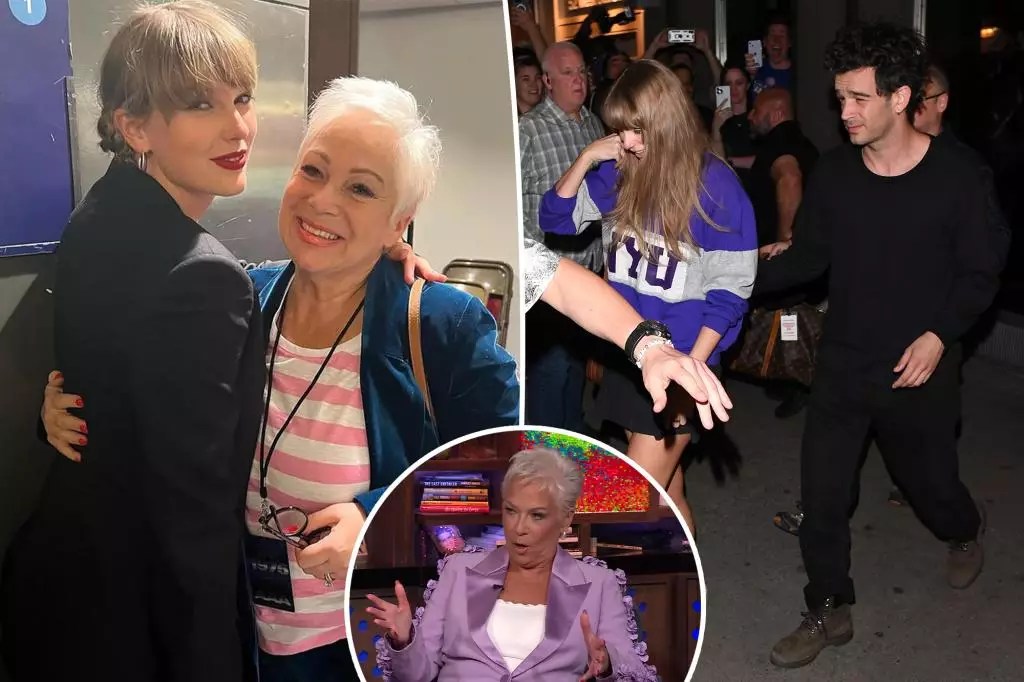In the world of entertainment, few interactions are as revealing—or as volatile—as open displays of bitterness or indifference. Denise Welch’s blunt dismissal of Taylor Swift’s potential role as her daughter-in-law underscores how personal celebrity disputes can become, not just between the individuals involved, but overtly, in the public eye. Her comments, dripping with sardonic pleasure, unveil an underlying competition for relevance and status, typifying how hoverings of old relationships can flare into spectacle. Welch’s tone suggests a deliberate attempt to diminish Swift’s stature, framing her as a figure of pain and complication in her son’s life, yet her words also emphasize a thinly veiled desire to maintain her own importance within the narrative.
The episode exemplifies how celebrities, whether directly involved or merely peripheral, use media moments to reaffirm boundaries—sometimes with sharp edges. Welch’s remarks demonstrate the tendency of older celebrities to cling to their perceived authority, often masking genuine feelings with theatrical bravado. Her claim that she’s “glad” she’s not part of Swift’s life might be rooted in genuine relief, but it also reads as strategic, revealing her discomfort with the messy intersections of fame, family, and personal history.
The Complexity of Image and Public Perception
Taylor Swift’s latest album, “The Tortured Poets Department,” fuels ongoing speculation about her emotional state and the depths of her lyrical introspection. Welch’s commentary, however, shifts the focus from the art to the artist’s personal life—raising questions about how much of celebrity culture is rooted in real turmoil versus manufactured narrative. Informally, Welch alludes that Swift’s songwriting is a reflection of past heartbreaks, yet her tone suggests skepticism about the sincerity or legitimacy of those emotions, implying perhaps that Swift exploits these stories for commercial gain.
Meanwhile, the brief, tumultuous romance between Swift and Healy, once heralded by fans and media alike, now seems like a fleeting chapter that fades into the background of larger life stories. Healy’s subsequent engagement and happiness with a new partner highlight an often-overlooked truth: in celebrity narratives, romantic entanglements are transient, yet they leave lasting scars and stories that are dissected endlessly. Welch’s statement about Healy’s “good grace” underscores her perception of a gentlemanly exit, an act of maturity in the relentless machinery of fame.
An Industry Obsessed With Feuds and Gossip
At its core, this scenario exemplifies the entertainment industry’s obsession with scandal, especially when it involves well-known figures. Every comment, every snide remark, becomes fodder for media analysis and public debate. Welch’s casual jabs reveal how celebrity feuds are often less about genuine animosity and more about maintaining relevance and audience engagement. These stories thrive on the friction between personalities—a reminder that behind the glitter and fame, much of what is portrayed is crafted for attention.
Moreover, owning one’s narrative becomes crucial in an era where social media and tabloids amplify every nuance. Welch’s candidness, whether strategic or authentic, adds a new layer to the narrative surrounding Swift and Healy, transforming whispers into headlines and private pain into public spectacle. The ongoing dance of perception and reputation underscores how fragile celebrity personas are—yet how fiercely they are defended, manipulated, or dismantled based on the latest scandal.
This landscape also prompts us, as consumers of celebrity culture, to question the authenticity behind what’s presented. Are these feuds genuine expressions of emotion, or meticulously curated stories designed to bolster a brand? Perhaps it’s a blend of both, but one thing remains certain: celebrity conflicts, especially when wrapped in layers of personal vulnerability and industry maneuvering, are rarely simple.







Leave a Reply